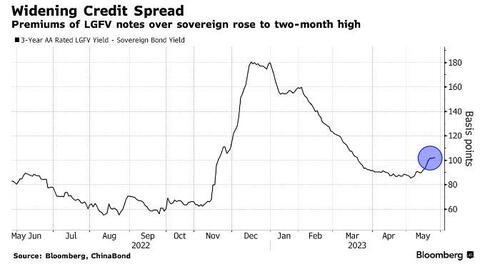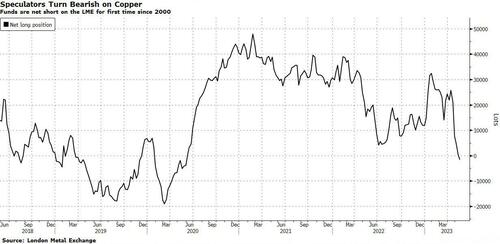China Shadow Banking Defaults Surge
Three things we learned last week:
1. A town builder’s last-minute bond repayment reignited fears over a potential default by such issuers. Investors are watching out for the first missed payment by a local government financing vehicle, something regional authorities are trying hard to avoid. The possibility has recently increased, as a weakening fiscal situation means authorities are less able to provide support.
Research from GF Securities Co. shows there were 73 cases of shadow-banking defaults in the first four months, already a full-year record since data became available in 2018.
“Missing payments in shadow banking are a signal that debt risks in a certain region have become more prominent,” GF analysts led by Liu Yu wrote in a report.
Yields on Kunming Dianchi Investment Co.’s note due in December surged to over 20% last week, as two holders said they didn’t receive payments until after business hours for a note due this month. Premiums of three-year AA rated LGFV bonds widened to the most since March, and investors cited local-debt worries as one of the reasons behind a decline in Chinese stocks.
China’s LGFVs had 13.5 trillion yuan ($1.9 trillion) of bonds in total outstanding as of end-2022, or almost half of the nation’s non-financial corporate notes, data from Moody’s Investors Service show.
Steps by authorities “to lower LGFV debt risks will not fully resolve long-term issues,” and their refinancing ability depends on investors’ confidence in government support, especially in weaker provinces, Moody’s analysts led by Ivan Chung wrote in a report.
2. With the financial strength of both town builders and their sponsors deteriorating, investors became more pessimistic about China’s demand for raw materials. Copper dived below $8,000 a ton while iron ore breached $100, unwinding gains since Beijing ended its Covid Zero policies late last year.
At the London Metal Exchange’s annual Asian event in Hong Kong, participants reported lackluster activity and said that any market optimism from the National People’s Congress in March had evaporated.
The selloff in Chinese stocks also extended, with the benchmark CSI 300 Index erasing all of its gains for the year. Now, even bulls are rethinking their calls, with Citigroup Inc.’s global allocation team cutting its overweight rating on China to neutral.
The Shenzhen Real Estate Intermediary Association in South China’s Guangdong Province released a notice on Friday, cautioning local agencies to avoid participating in or assisting the illegal practices of “zero down payment” and “negative down payment,” which have sparked discussion among homebuyers.
Some real estate agencies have been marketing homebuying with “zero down payment” or “negative down payment” so that consumers not only don’t need to pay for down payment but also can obtain funds for future renovation, according to media reports.
One real estate agency based in Shenzhen reportedly was telling clients that if a property is evaluated at 5.7 million yuan ($806,828) the owner would sell it at 5.2 million yuan, the homebuyer could then buy the property in full using a bank loan of 5.7 million yuan while using the remaining 500,000 yuan for renovation, cnr.cn reported.
As for the so-called “negative down payment,” the report said that it is executed through developers using down payment installments and returning down payment to buyers or setting a relatively high contract price for consumers to apply for a larger bank loan.
h/t Simian_Stacker

